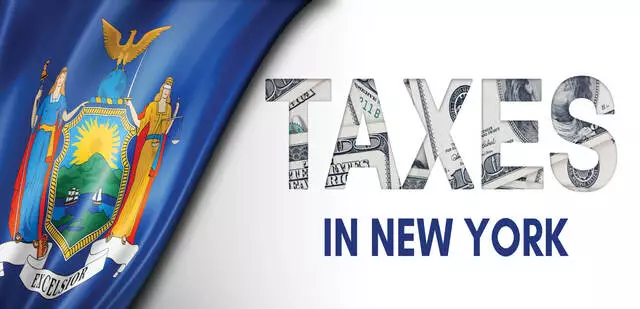
The DTA snuck a few cases onto the website late on July 27, and I am just getting around to them now with the cases that dropped on August 3. There’s a Tribunal decision on a substantive legal issue, so, yay. And Judge Maloney, before whom I have appeared at least a couple of times, dropped a petitioner-favorable combination determination on a case involving the dark years between 2007 and 2014 when combination was all about substantial intercompany transactions.
Tax Appeals Tribunal Decision:
Matter of O'Connor, July 20, 2023; Div’s Rep. Michael Trajbar, Esq.; Pet’s Rep, pro se; Article 22 (interest accrual).
In her originally-filed 2016 return, Petitioner asked for a refund of $4,467 and got it. The refund was paid on November 2, 2017. It turns out Petitioner may have been overly-optimistic with the calculation of her college tuition credit, so the Division sent her a Notice on November 25, 2019, asserting additional tax of $400 and interest calculated from the original due date of the return, April 15, 2017.
“Pump the brakes,” said Petitioner. “The State had more than $4,000 of my money from April 15, 2017, until November 2017, and it didn’t pay me a nickel of interest. Further, the State wasn’t out of pocket at all until it paid me the claimed refund in November 2017. At the very least, the State shouldn’t start the interest accruing until the date it paid me the erroneous refund.” That all makes perfect sense. So, of course, the Tribunal sustained the ALJ’s denial of the petition and demanded that all of the interest that accrued after April 15, 2017, be paid even though the State was not out of pocket for all of that period. The Tribunal’s finding was not supported by a citation to a specific statute, but instead by a citation to the following passage from 20 NYCRR 157.7: “… interest ‘accrues on any balance of New York State personal income tax ... due from the due date of the New York State personal income tax return (determined without regard to any extension of time to file), to the date of payment.’” Of course, this ignores the undisputed fact that the tax owed was paid and on account with the Division as of the due date of the return and for at least six months thereafter.
I agree with the Tribunal that the law might be construed to say what the Tribunal said the law says. But to paraphrase Dickens’ Mr. Bumble: “If that is what the law says, the law is an ass.”
Petitioner also made an argument concerning the constitutionality of the Division’s method of accruing interest which the Tribunal found to be less than meritorious.
ALJ Determinations:
Matter of Lendlease America Holdings, Inc. and Subsidiaries, Judge Maloney, July 27, 2023; Div’s Rep. David Markey, Esq.; Pet’s Rep. Edmund Cohen, Esq.; Article 9-A (combination).
The last shall be first this week. Even though this was the only ALJ case posted on August 3, I’m writing this up first. Frankly, I’m a little worried that you’d never get to this entrée case—which is a pretty interesting one—if I force-fed you the bread and butter process determinations posted on July 27.
Petitioner was the group of US affiliates of an Australian corporation that was generally in the business of real estate investment. All but one of the US affiliates—YLL KOP—was included on the New York combined corporate franchise tax return. Why was YLL KOP excluded? Pretty much because there were relatively few intercompany transactions between YLL KOP and the rest of the US affiliates, and YLL KOP passively held a 50% partnership interest in a partnership that owned a big mall in King of Prussia, Pennsylvania. And let me pause to marvel for a moment at sister-state Pennsylvania’s penchant for coming up with unique names for its municipalities. King of Prussia? State College? Wilkes-Barre? And then there is that sublime study in municipal redundancy: Doylestown Township (pop. 17,573). It’s as if Elon Musk invented a time machine (don’t we all assume he is working on one?) and sent Grimes back to 17th Century Pennsylvania to name all of the cities, towns and villages!
I digress.
Following an audit the Division insisted that YLL KOP be included on the combined report, and this litigation followed.
The parties agreed that the ownership requirement for combination was satisfied. But there were other requirements. During two of the years at issue, the statute required inclusion on a combined report if the corporations: (1) were commonly owned, and (2) either (a) there were substantial intercompany transactions between the corporations, or (b) there was something about the financial relationship that distorted the income or capital the related corporations reported to New York.
This is a long (56 page) determination, and TiNY’s readers are busy people. So, here’s the super-skinnied-down version:
Judge Maloney found that Petitioner and YLL KOP were not engaged in a unitary business. This is interesting because during two of the years at issue, whether or not a unitary business existed was not part of the statutory test for combination. But perhaps the Judge felt that a unitary business was required by the US Constitution. The absence of a unitary business was supported by the relative lack of intercompany transactions, and those were engaged in at arm’s length, so there was no “flow of value” between Petitioner and YLL KOP. In particular, the Judge found that the presence of arm’s length interest on a significant intercompany note was enough to result in the note not creating a flow of value. Further, the level of management oversite of YLL KOP by Petitioner’s constituent member corporations was found by the Judge to be de minimus (this also contributed to the Judge finding there was no centralized management present between YLL KOP and Petitioner). And it was found that the business of the combined corporations—project management/construction and military communities—was distinct from YLL KOP’s passive ownership of a partnership interest in an entity owning a big chunk of a unique commercial real property.
The Division, citing Matter of SunGard Capital Corp., argued that there must be a flow of value because YLL KOP didn’t have its own bank account and used Petitioner’s constituent corporations as a captive bank. Judge Maloney disagreed and distinguished SunGard on the basis that there was no interest charged by the related entities in SunGard whereas there were arm’s length interest charges between Petitioner and YLL KOP.
Regarding the “economies of scale” unitary prong, the Judge noted that there was very little overlap in the operations of YLL KOP and Petitioner’s constituent corporations, and “[t]he Division’s assertion that YLL KOP’s line of business was clearly “complimentary” [sic] to other businesses of the Lendlease U.S. Group lacks foundation and substance.”
The Judge also found that substantial intercompany transactions between Petitioner and YLL KOP were absent. There were no intercompany sales, and less than 50% of YLL KOP’s expenditures were intercompany expenditures. Of interest here was the Judge’s finding that, for determining whether the 50% threshold was met, YLL KOP’s expenditures included not only its direct expenditures but also its pro rata share of the expenditures of the partnership of which it was part-owner. As far as I know, this is the first time that particular issue was addressed by the DTA.
The presence of arm’s length pricing on intercompany charges also supported the Judge’s determination that the relationship between Petitioner and YLL KOP did not distort either Petitioner’s or YLL KOP’s New York tax liability.
Based on the above, Petitioner was found to have properly reported its New York franchise tax by excluding YLL KOP from its combined return.
Matter of Burgess, Supervising ALJ Gardiner, July 20, 2023; Div’s Rep. Lori Antolick, Esq.; Pet’s Rep. pro se; Article 22.
Following the DTA’s issuance of a Notice of Intent to Dismiss, SALJ Gardiner dismissed the petition on jurisdictional grounds. Neither a statutory notice nor a conciliation order was attached to the petition and that deficiency was not cured by Petitioner following the DTA’s written request.
Matter of Jesus Christ is the Savior Trucking, LLC, Supervising ALJ Gardiner, July 20, 2023; Div’s Rep. Kaitlyn Smith, Esq.; Pet’s Rep. pro se; Article 21.
Following the DTA’s issuance of a Notice of Intent to Dismiss, SALJ Gardiner dismissed the petition on jurisdictional grounds. Neither a statutory notice nor a conciliation order was attached to the petition and that deficiency was not cured by Petitioner following the DTA’s written request.
Matter of Long Island VIRA Service Corp., Supervising ALJ Gardiner, July 20, 2023; Div’s Rep. Amy Seidenstock, Esq.; Pet’s Rep. pro se; Article 9-A.
Following the DTA’s issuance of a Notice of Intent to Dismiss, SALJ Gardiner dismissed the petition on jurisdictional grounds. Neither a statutory notice nor a conciliation order was attached to the petition and that deficiency was not cured by Petitioner following the DTA’s written request.
Matter of Jelagat and Modibo, Supervising ALJ Gardiner, July 20, 2023; Div’s Rep. Amy Seidenstock, Esq.; Pets’ Rep. pro se; Article 22.
Following the DTA’s issuance of a Notice of Intent to Dismiss, SALJ Gardiner dismissed the petition on jurisdictional grounds. Neither a statutory notice nor a conciliation order was attached to the petition and that deficiency was not cured by Petitioner following the DTA’s written request.
Matter of Olsen, Supervising ALJ Gardiner, July 20, 2023; Div’s Rep. Peter Ostwald, Esq.; Pet’s Rep. pro se; Article 22.
Following the DTA’s issuance of a Notice of Intent to Dismiss, SALJ Gardiner dismissed the petition on jurisdictional grounds. Neither a statutory notice nor a conciliation order was attached to the petition and that deficiency was not cured by Petitioner following the DTA’s written request.
Matter of Randall, Supervising ALJ Gardiner, July 20, 2023; Div’s Rep. Daniel Schneider, Esq.; Pet’s Rep. pro se; Article 22.
Following the DTA’s issuance of a Notice of Intent to Dismiss, SALJ Gardiner dismissed the petition on jurisdictional grounds. Neither a statutory notice nor a conciliation order was attached to the petition for two out of the three years at issue and that deficiency was not cured by Petitioner following the DTA’s written request. The petition was signed by Petitioner’s brother, but no Power of Attorney authorizing the brother to act as Petitioner’s representative was included with the petition and that deficiency was likewise not cured following the DTA’s written request.
Tremont Finest Deli Corp, Supervising ALJ Gardiner, July 20, 2023; Div’s Rep. Amy Seidenstock, Esq.; Pet’s Rep. Richard Barton, Esq.; Article 20.
Following the DTA’s issuance of a Notice of Intent to Dismiss, SALJ Gardiner dismissed the petition on jurisdictional grounds. Neither a statutory notice nor a conciliation order was attached to the petition and that deficiency was not cured by Petitioner following the DTA’s written request. The Notice and Demand and Consolidated Statement of Tax Liabilities attached to the petition were not the types of notices that would confer jurisdiction on the DTA.

